Why Does My French Bulldog Eat Grass? 4 Reasons To Know
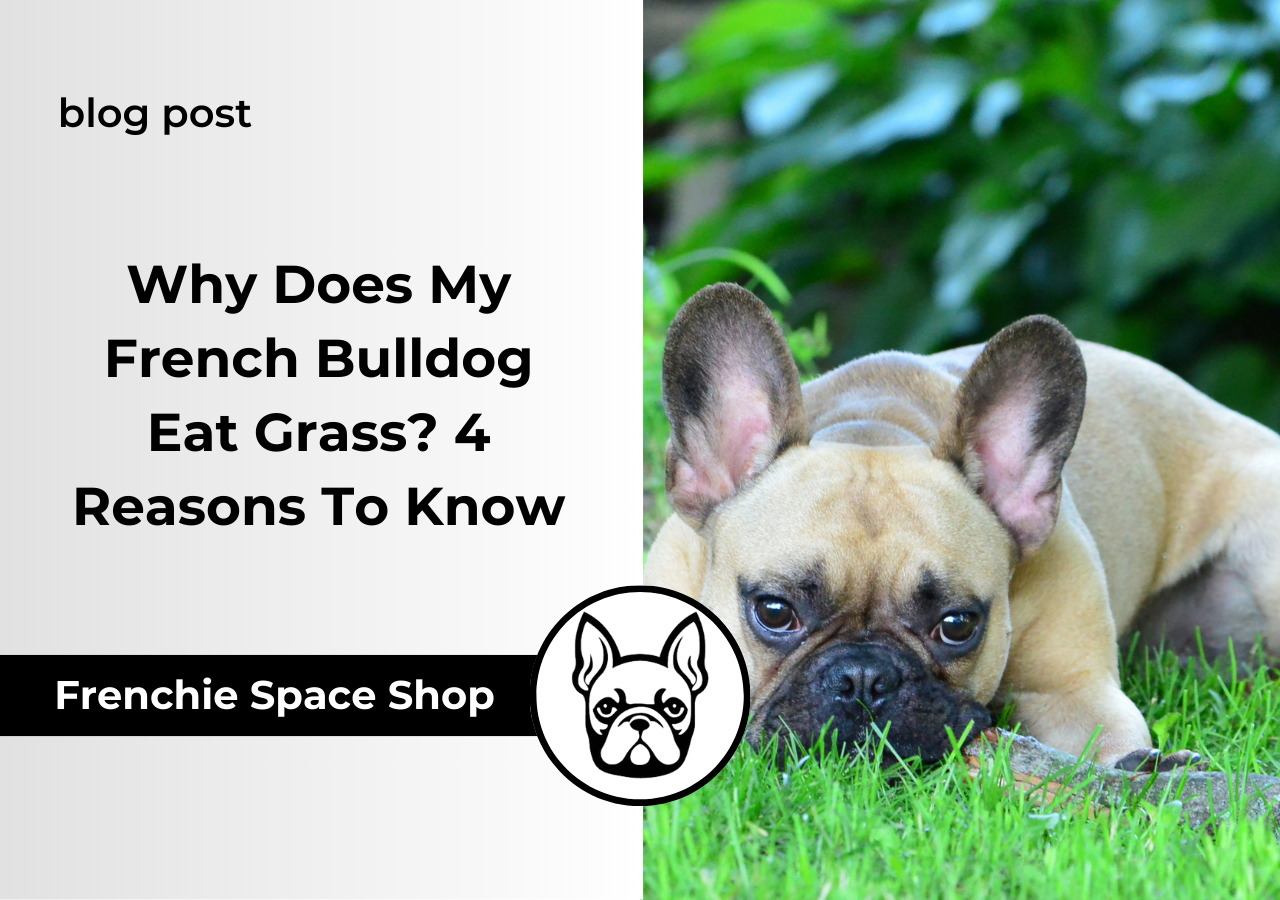
If you’ve noticed your French bulldog munching on grass, you’re not alone! This behavior, known as grass-eating or pica, is fairly common in dogs. While it might seem puzzling (and a little concerning), dogs eating grass is a behavior that has several possible explanations. They range from boredom and instinct, to potential health issues. In this article, we’ll list the reasons why does a French bulldog eat grass, when it’s normal, when you should worry, and how to manage this behavior if it becomes excessive.
Is It Normal for French Bulldogs to Eat Grass?
Yes, it’s entirely normal for Frenchies to eat grass, and in most cases, it’s harmless. Many dogs, regardless of breed, exhibit this behavior occasionally. Some experts believe that dogs instinctively eat grass to supplement their diet, soothe upset stomachs, or satisfy a need for fiber. While the behavior is common, frequent or excessive grass consumption can sometimes indicate an underlying issue.
Theories Behind Why Does a French Bulldog Eat Grass
There’s no single answer to explain why Frenchies chew on grass, but several plausible theories exist. Below, we explore the most popular explanations.
Many people used to believe that dogs eat grass to make themselves vomit when their stomachs are upset. However, more recent studies have shown that only about 25% of pets vomit after eating grass, meaning it’s not always intentional or linked to digestive relief. So, what’s really behind your Frenchie’s love for grass? Let’s explore some of the most common reasons why your French bulldog might be munching on grass.
1. Hunger, With or Without Nutritional Deficiency
Sometimes, dogs eat grass because they are hungry or not getting enough nutrients from their diet. French bulldogs, like all dogs, often explore their environment by mouthing or chewing on things. But when your dog starts ingesting grass regularly, it could be a sign of hunger or even a nutritional imbalance.
– Poor-Quality Dog Food or Fillers in Kibble
Even if you’re feeding your dog the recommended amount of food, what really matters is how well their body absorbs nutrients. Some dog foods contain fillers—ingredients added to bulk up the food but with little to no nutritional value. Common fillers include corn, soy, and wheat by-products, which offer minimal nourishment and can disrupt your pet’s blood sugar levels.
When a dog’s diet is loaded with fillers, they might still feel hungry or unsatisfied, which could prompt them to search for additional food sources, like grass. This behavior might mean that your Frenchie isn’t getting enough essential nutrients such as protein, healthy fats, vitamins (A, D, B-complex, and E), minerals, and Omega-3 fatty acids.
– Hunger Linked to Health Issues
In some cases, health problems can trigger an increased appetite, leading your pooch to eat grass in an attempt to compensate. Conditions such as diabetes, inflammatory bowel disease (IBD), hyperthyroidism, or exocrine pancreatic insufficiency (EPI) can make it difficult for your dog to properly digest or absorb nutrients, leaving them feeling hungry all the time. Parasites—especially tapeworms—can also interfere with nutrient absorption, causing your pet to seek extra sources of food.
2. Grass-Eating as a Compulsive Habit
For some dogs, eating grass becomes a habit or a soothing activity, especially if they’re often left unsupervised outside. What begins as a curious nibble might turn into a time-filler if your pet finds chewing on grass enjoyable or calming. This is more likely to happen if your dog isn’t getting enough mental or physical stimulation throughout the day.
Frenchies are curious and energetic by nature, so if they feel bored, they might turn to grass-eating just to entertain themselves. This behavior is particularly common in dogs left alone for long periods or in situations where the owner is nearby but distracted.
3. Attention-Seeking Behavior
Some pooches eat grass to get their owner’s attention. Dogs are smart and quickly learn which behaviors will get a response from their humans. If you’ve ever rushed over to stop your French bulldog from eating grass, reacted with frustration, or tried to lure them away, your dog may have realized that this is an easy way to grab your attention.
For Frenchies who crave interaction, grass-eating might become a way to make sure you notice them. Even negative attention—like scolding or pulling them away—can reinforce the behavior if your dog feels ignored otherwise.
4. Ancestral Instinct: Why Does Your French Bulldog Eat Grass?
Believe it or not, your Frenchie’s grass-eating habit could be linked to their wild ancestors. Wolves and foxes in the wild would munch on grass and plants, either directly or when they ate herbivores with plant-filled stomachs. Even though these animals are mainly meat-eaters, they got some extra fiber and nutrients from vegetation to keep things moving smoothly in their digestive systems.
Your frog dog may not need to hunt prey or forage for food, but some of those old instincts can still stick around. Grazing on grass might just be their way of echoing those wild behaviors, even if they don’t actually need it. Some dogs chew on grass to satisfy an urge for extra roughage, even if they’re getting enough nutrients from their regular food. At the end of the day, it’s just another quirky reminder that, deep down, our little gremlins are still connected to their wild roots!
How Can You Manage Your French Bulldog’s Grass-Eating Habit?
If your French bulldog’s grass-eating behavior isn’t causing any health problems, it’s usually harmless. However, if the behavior becomes excessive or leads to vomiting, you might want to take steps to curb it. Start by evaluating their diet to ensure they’re getting the nutrients they need. Switch to a high-quality, well-balanced dog food if necessary, and consider adding dog-safe vegetables like carrots or green beans to boost fiber intake.
Additionally, make sure your dog is getting plenty of exercise, playtime, and mental stimulation to prevent boredom. Engage them with interactive toys and spend time training them, which will also help discourage attention-seeking behaviors like grass-eating.
If you suspect that a health issue is contributing to your Frenchie’s grass-eating, or if they show signs of illness—like frequent vomiting, diarrhea, or weight loss—it’s important to consult your vet. A medical check-up can rule out underlying conditions and ensure your Frenchie’s health is in tip-top shape.
Can Eating Grass Help with Indigestion?
Some dogs eat grass when they feel nauseous or have an upset stomach. Although it’s unclear whether grass really helps dogs vomit or soothe their digestive issues, many pet owners report that their dogs seem to feel better after throwing up. However, if your French bulldog vomits frequently after eating grass, it could indicate a more serious issue that requires veterinary attention.
Nutrient Deficiency: A Possible Cause?
In some cases, grass-eating may signal that your French bulldog’s diet lacks certain nutrients, especially fiber. Even though commercial dog foods are formulated to meet nutritional needs, some dogs still crave additional roughage. Consider whether your frog dog is eating enough high-quality food, or consult your vet about switching to a diet that contains more fiber. Adding dog-safe vegetables to their meals, like green beans or carrots, can help provide the necessary fiber.
Stress and Anxiety in Frenchies
These little gremlins are known to be sensitive dogs, and stress or anxiety can contribute to unusual behaviors like eating grass excessively. Changes in their environment—such as a move, new family member, or loud noises—can trigger anxiety. Grass-eating may serve as a coping mechanism.
Common Signs of Stress in French Bulldog:
- Excessive barking or whining.
- Pacing and restless behavior.
- Increased desire to chew on things, including grass.
If you suspect anxiety, try to identify the triggers and provide comfort or distraction. Calming treats, regular routines, and gentle training can help ease your Frenchie’s stress.
Is Eating Grass Safe for My French Bulldog?
For the most part, eating small amounts of grass isn’t dangerous. However, there are some risks you need to consider:
- Pesticides and Herbicides: Lawns treated with chemicals can be toxic to dogs.
- Sharp Grass Blades: Some types of grass can cause minor injuries to your Frenchie’s throat or digestive system.
- Parasites: Grass can harbor parasites, such as roundworms, that your little gremlin might ingest.
To ensure safety, monitor where your French bulldog eats grass, and try to keep them away from treated or wild areas.
When to Worry: Signs of a Problem
While occasional grass-eating is normal, there are some signs that warrant concern:
- Frequent vomiting after eating grass.
- Loss of appetite or weight loss.
- Lethargy or changes in behavior.
- Diarrhea or blood in stool.
If your Frenchie shows any of these symptoms, consult your veterinarian. These could be signs of a gastrointestinal issue or other health concern that needs immediate attention.
Should You Stop Your Frenchie from Eating Grass?
It’s not always necessary to stop your French bulldog from eating grass unless it’s causing problems. In moderation, grass-eating is generally harmless. However, if your dog is eating grass obsessively or frequently getting sick from it, it’s time to intervene.
Tips to Reduce Grass-Eating Behavior in French Bulldogs
If your Frenchie’s grass-eating habit has become concerning or excessive, don’t worry—there are several strategies you can use to minimize the behavior. Reducing grass-eating often involves a combination of mental stimulation, proper nutrition, and supervision. Below are practical tips to discourage your French bulldog from munching on grass while keeping them happy and healthy.
1. Increase Exercise and Playtime
One of the simplest ways to curb grass-eating behavior is to increase your Frenchie’s physical activity. French bulldogs need regular exercise to stay mentally and physically satisfied. When your Frenchie is tired, they are less likely to engage in unwanted behaviors like chewing on grass out of boredom.
What you can do:
- Take your French bulldog on daily walks, at least 20 to 30 minutes.
- Include interactive play sessions, like fetch or tug-of-war.
- Consider agility exercises or obedience training to challenge them both mentally and physically.
A well-exercised dog is more likely to relax and nap instead of chewing on random things in the yard.
2. Use Puzzle Toys to Stimulate Your Frenchie’s Mind
Mental stimulation is just as important as physical exercise for French bulldogs, especially since boredom is a common reason behind grass-eating behavior. Interactive toys and puzzle feeders can keep your dog occupied and reduce their need to nibble on grass out of curiosity.
Examples of puzzle toys for French bulldogs:
- Treat-dispensing balls: Your French bulldog will stay entertained trying to release treats from the ball.
- Snuffle mats: These simulate foraging and encourage your dog to search for hidden snacks, mimicking their natural instincts.
- Interactive feeder toys: These slow down eating while engaging your Frenchie’s brain during mealtime.
By giving your Frenchie challenging tasks to focus on, they’ll be less inclined to resort to grass-chewing as a way to pass the time.
3. Try a New Diet to Meet Nutritional Needs
Diet plays a critical role in preventing grass-eating in Frenchies. If your dog isn’t getting all the nutrients they need from their current food, they may seek alternatives like grass. Even though most commercial dog foods are designed to meet canine nutritional requirements, not all kibbles are created equal. Some contain fillers (like corn and soy) that leave dogs feeling unsatisfied.
How to improve your French bulldog’s diet:
- Switch to high-quality dog food without fillers or artificial ingredients.
- Look for food with real meat listed as the first ingredient, along with healthy fats and essential vitamins.
- Add fiber-rich vegetables (such as carrots, green beans, or pumpkin) to their meals.
If you suspect a specific nutritional deficiency, consult your vet. They may recommend supplements like Omega-3 fatty acids, probiotics, or multivitamins to ensure your Frenchie’s diet is well-rounded. A balanced diet will help reduce your Frenchie’s urge to eat grass and keep them feeling full and satisfied.
4. Provide Chew Toys and Alternatives to Grass
Dogs love to chew—it’s soothing and helps keep their teeth clean. If your French bulldog is chewing on grass, it may simply be because they enjoy the sensation. By offering safe alternatives, you can redirect their behavior and discourage them from chewing on grass.
Recommended chew toys for French bulldogs:
- Dental chews: These not only satisfy their chewing needs but also promote good oral hygiene.
- Rubber bones or ropes: Durable and safe for even the most enthusiastic chewers.
- Natural chews: Options like bully sticks or yak milk chews are both tasty and long-lasting.
Always supervise your Frenchie with new chews to ensure they don’t swallow large pieces, which could pose a choking hazard.
5. Monitor Your French Bulldog’s Outdoor Time
Supervision is key when trying to stop your French bulldog from eating grass, especially if they’ve developed a habit of doing so when left alone. Keeping a close eye on your dog during outdoor playtime allows you to redirect their attention before they start munching on grass.
Tips for monitoring outdoor time:
- Stay present in the yard and engage your Frenchie in play to prevent boredom.
- Use verbal commands like “leave it” or “no” to discourage them from eating grass. Reward them with a treat or praise when they obey.
- Consider using a leash or long lead to control their movement if they tend to roam and eat grass unsupervised.
You can also try creating a specific play area in the yard with toys and treats to focus their attention. This way, your pet will have something positive to engage with, minimizing their interest in grass-chewing.
Why Does My French Bulldog Eat Grass? Wrapping Up
French bulldogs eating grass is a fairly common behavior, and most of the time, it’s nothing to worry about. However, it’s important to monitor the frequency and context of this behavior to rule out potential health or behavioral issues. Whether it’s boredom, curiosity, or a nutritional need, understanding the reasons behind your Frenchie’s grass-eating habit will help you manage it effectively.

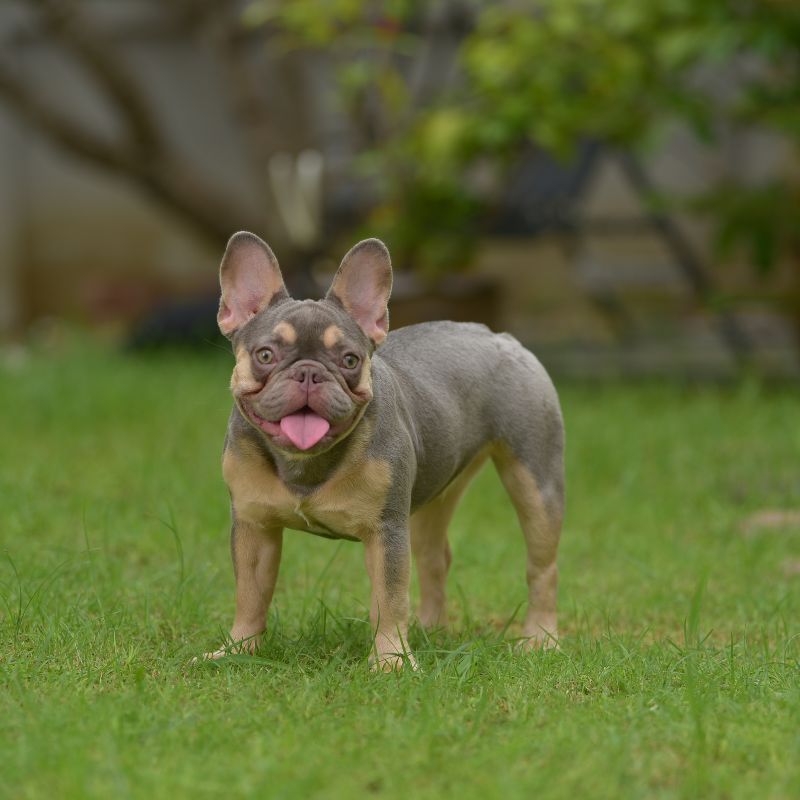
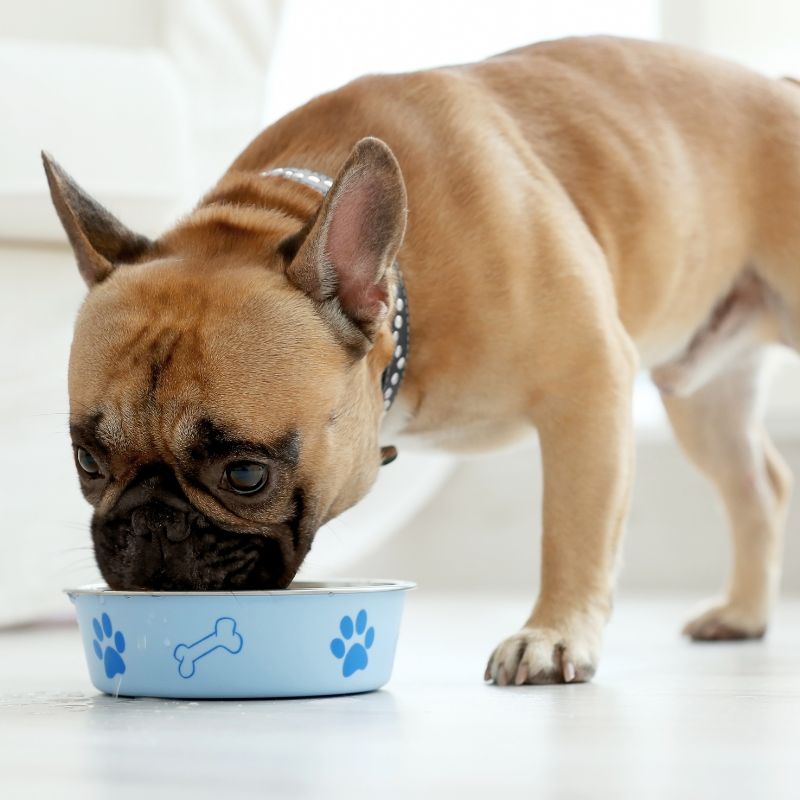
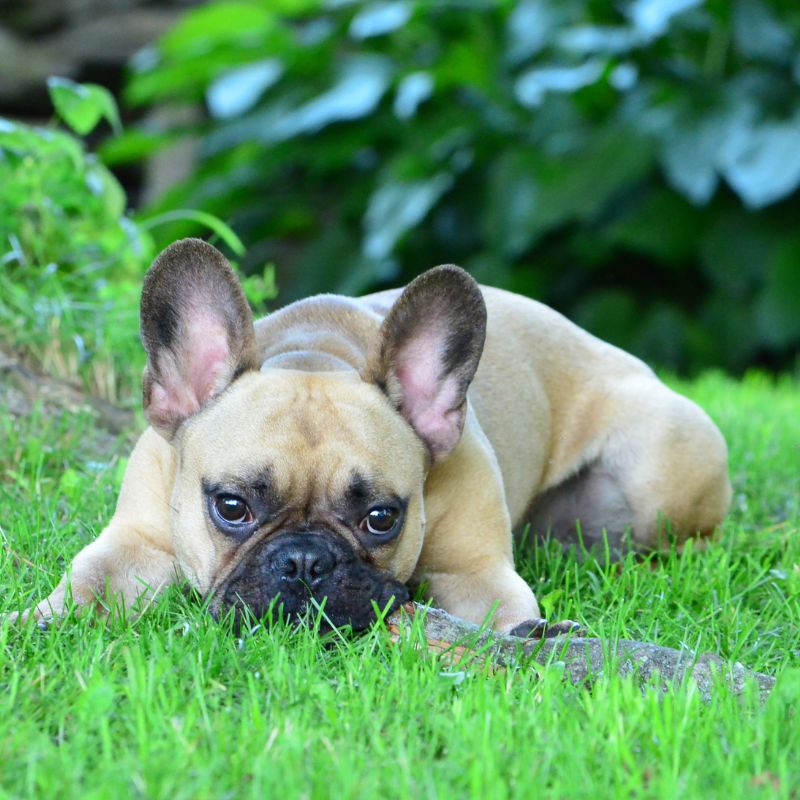
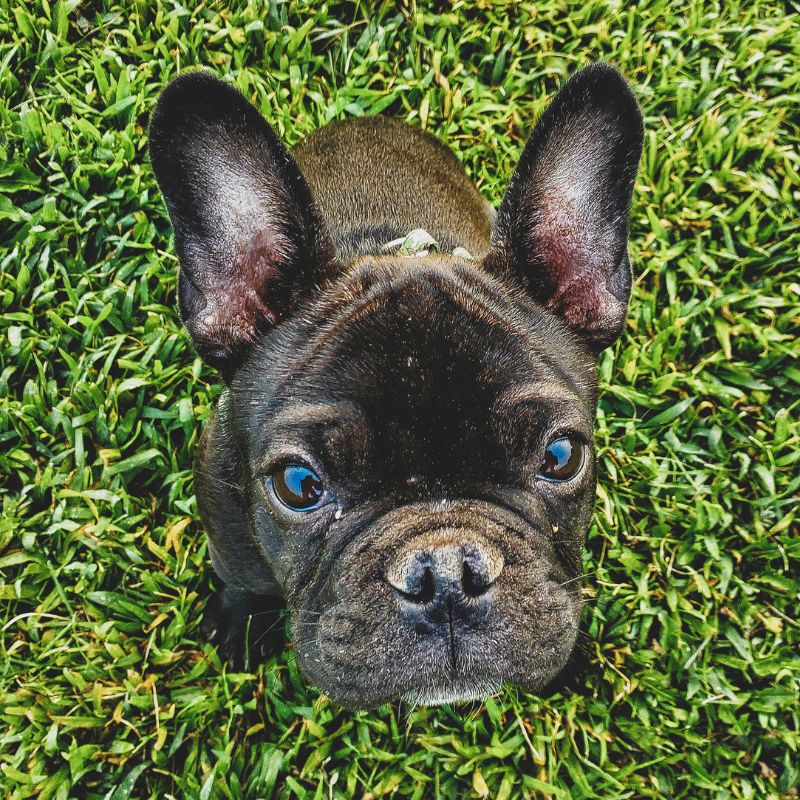
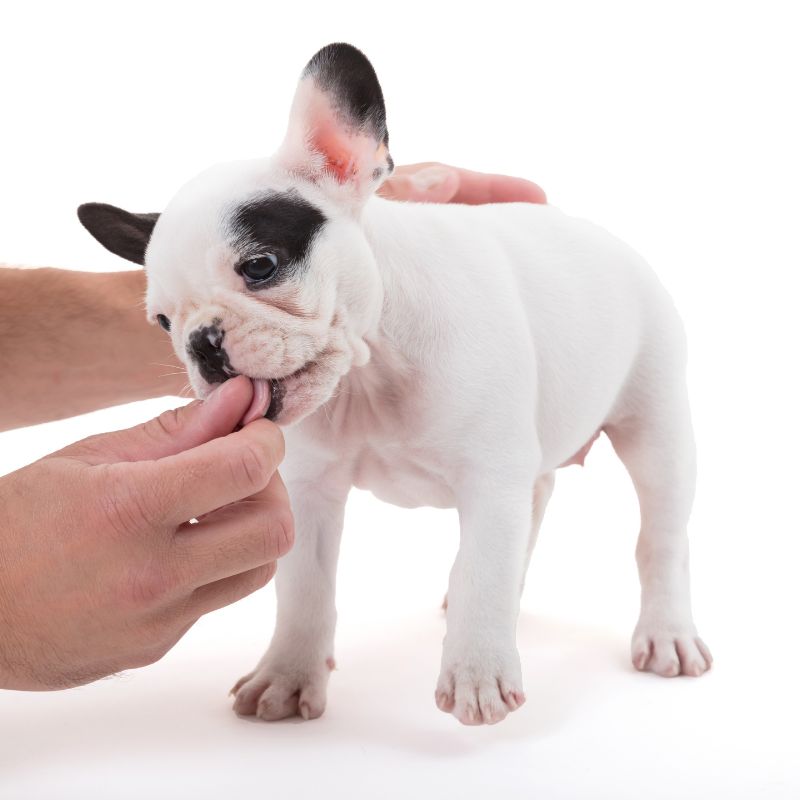



 French Bulldog Jackets & Coats
French Bulldog Jackets & Coats French Bulldog Dresses & Skirts
French Bulldog Dresses & Skirts French Bulldog Hoodies
French Bulldog Hoodies French Bulldog Sweaters
French Bulldog Sweaters French Bulldog Shirts
French Bulldog Shirts French Bulldog Pajamas
French Bulldog Pajamas French Bulldog Costumes
French Bulldog Costumes French Bulldog Life Jackets
French Bulldog Life Jackets

 French Bulldog Collars
French Bulldog Collars French Bulldog Harness
French Bulldog Harness
 French Bulldog Backpacks
French Bulldog Backpacks







